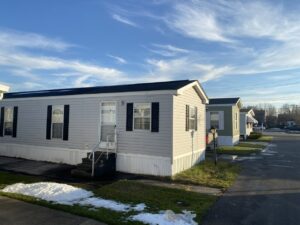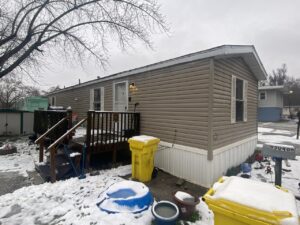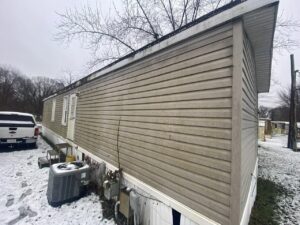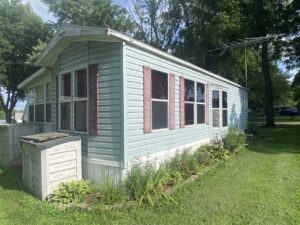In the world of housing, big isn’t always better. Enter the tiny house trailer – a compact living solution that packs a punch. These small wonders offer mobility and freedom, contrasting starkly with traditional homes. Imagine having your cozy haven on wheels, ready to roll wherever adventure calls. With ingenious design and functionality, these tiny homes redefine modern living. Join us as we explore the charm and practicality of tiny house trailers in this insightful journey.
Benefits of Tiny House Trailers
Mobility and Flexibility
Tiny house trailers provide the freedom to move your home wherever you desire. Whether it’s a change in scenery or relocating for work, these trailers offer unparalleled mobility. Imagine waking up to a different view every day simply by hitching your tiny house trailer onto a vehicle and hitting the road.
Tiny house trailers are like turtles carrying their homes on their backs, allowing owners to explore new places without leaving the comfort of their own space. This level of mobility is unmatched by traditional houses and apartments.
Cost-Effective Living
One significant advantage of opting for a tiny house trailer is the cost-effective living it offers. With lower utility bills and reduced maintenance costs compared to larger homes, tiny house living can significantly decrease monthly expenses. By downsizing, individuals can save money while still enjoying all the comforts of home.
Moreover, due to their smaller size, heating and cooling requirements are minimized in tiny house trailers, resulting in additional savings on energy bills over time. The financial benefits make them an attractive choice for those looking to live more frugally or save up for other endeavors.

Choosing the Right Trailer for Your Tiny Home
Weight Capacity and Towing Requirements
When choosing a tiny house trailer, it’s crucial to consider the GVWR (Gross Vehicle Weight Rating) to ensure it can support your tiny home. Look for trailers that match or exceed the weight of your structure. This ensures safe towing and proper weight distribution.
Consider the towing requirements of the trailer, including hitch type compatibility with your vehicle. Ensure you have the right equipment and capabilities to tow your tiny home safely.
Check GVWR
Match weight capacity
Confirm hitch compatibility
Adjustable Height and Width Options
Opt for a size trailer that offers adjustable height and width options for customization based on your tiny home design. Having this flexibility allows you to tailor the trailer dimensions to fit your specific needs, ensuring a seamless integration between your tiny house and its foundation.
Look for trailers with telescoping features or extendable sections that can accommodate various sizes of tiny homes comfortably.
Design and Features of Tiny House Trailers
Space Optimization
Tiny house trailers are designed to optimize space utilization through clever design elements like loft areas and foldable furniture. These features help maximize the limited square footage available in a tiny home on wheels. For instance, loft areas can be used as bedrooms or storage spaces, while foldable furniture allows for multi-functional use of living areas.
Built-in storage options in tiny house trailers play a crucial role in maximizing functionality. By incorporating various storage solutions such as cabinets, drawers, and under-bed compartments, homeowners can efficiently organize their belongings without cluttering the living space. This ensures that every inch of the trailer is utilized effectively, contributing to a comfortable living experience.
Loft areas and foldable furniture optimize space
Built-in storage options maximize functionality
Essential Features
When selecting a tiny house trailer, it’s essential to consider key features like insulation, ventilation, and plumbing systems. Proper insulation helps regulate indoor temperature throughout the year, ensuring comfort regardless of external conditions. Adequate ventilation promotes air circulation within the confined space, preventing issues like moisture buildup or stuffiness.
The inclusion of plumbing systems in tiny house trailers enables occupants to have access to essential amenities such as sinks and showers. Choosing trailers with built-in brakes enhances safety during transportation by providing better control over speed and stability on the road.

Custom-Built vs. Pre-Designed Trailers
Flexibility of Custom-Built Trailers
Custom-built tiny house trailers allow for more flexibility in size, layout, and design. You can tailor the trailer to fit your specific needs and preferences, whether you require extra square footage or a unique floor plan. For instance, if you dream of a loft bedroom with ample headroom, custom-building your trailer would be the ideal choice.
When opting for a custom-built tiny house trailer, you have the freedom to choose features like fully painted fenders or specific marker lights placement based on your aesthetic preferences. Custom-built trailers often come with warranties that cater to individual specifications beyond standard offerings.
Benefits of Pre-Designed Trailers
On the other hand, pre-designed tiny house trailers provide a quicker and more cost-effective option for beginners entering the tiny house lifestyle. These trailers are ready-made with standard decks and painted black fenders, offering convenience without compromising quality. If you’re looking to kickstart your tiny home journey promptly while staying within budget constraints, pre-designed trailers might be the way to go.
Consider both options carefully based on your requirements and financial considerations before making a decision on whether to invest in a custom-built or pre-designed tiny house trailer.
Foundation and Construction Process
Anchoring for Stability
To ensure a solid foundation for your tiny house trailer, anchoring is crucial. Properly securing the trailer prevents shifting during transportation. By centering the load and using steel flush crossmembers, you enhance stability.
Anchoring also plays a significant role in ensuring safety while on the road. It prevents swaying or tipping of the tiny house, offering peace of mind during transport.
Lightweight Materials for Durability
When constructing your tiny house on a trailer, it’s essential to use lightweight materials without compromising durability. This approach helps minimize the overall weight of your structure while maintaining strength and integrity.
Financing and Cost-Effective Living
Tailored Financing Options
When investing in a tiny house trailer, consider tailored financing options available for such projects. Some lenders offer loans specifically designed for tiny homes, making it easier to secure funding. These loans often have flexible terms that suit the unique nature of tiny house living.
It’s crucial to calculate the long-term savings associated with tiny house trailers. Compared to traditional homes, these smaller dwellings can lead to significant cost savings over time. By reducing utility bills, mortgage payments, and maintenance costs, tiny house owners can enjoy more financial freedom and stability.
Embracing a Minimalist Lifestyle
Embracing a minimalist lifestyle is key when opting for a tiny house trailer. This way of living encourages individuals to declutter their lives, prioritize what truly matters, and reduce unnecessary expenses. By simplifying your life and possessions, you can live more sustainably within your means while enjoying the benefits of minimalism.

Lifestyle and Mobility with Tiny House Trailers
Nomadic Living Experience
Tiny house trailers offer the freedom to travel conveniently, exploring different locations without being tied down. Imagine waking up to a new view outside your window every day, embracing the adventure of nomadic living. Park your tiny house trailer amidst scenic landscapes or near serene lakes for a closer connection with nature.
Embrace the minimalist lifestyle that tiny houses promote – a departure from traditional homes but offering unparalleled freedom and mobility. Join a vibrant community of like-minded individuals who share your passion for compact living on wheels. Share resources, tips, and experiences with fellow tiny house enthusiasts as you navigate this unique way of life.
Community Engagement and Support
Connect with Like-Minded Individuals
Engage in tiny house festivals, workshops, and online forums to meet people who share your passion for tiny living. These events are great connection points to exchange ideas, gather inspiration, and build a supportive network within the tiny house community. By attending these gatherings, you can learn from others’ experiences and gain valuable insights into living in a tiny house trailer.
Joining these activities allows you to form friendships with individuals who understand the challenges and joys of tiny house living. Sharing stories about your journey can provide emotional support while also offering practical advice on various aspects of maintaining a tiny home on wheels.
Pros:
Networking opportunities
Access to diverse perspectives
Cons:
Limited availability in some regions
Explore Co-Housing Options
Consider exploring co-housing arrangements or joining established tiny house communities where residents live closely together, sharing resources and fostering a sense of belonging. Co-housing provides an excellent support system as neighbors collaborate on tasks like gardening or maintenance, creating a strong sense of community spirit.
Research existing co-housing setups near you.
Attend meetings or open houses to get a feel for the community dynamics.
Assess whether the shared values align with your own lifestyle choices.
Co-housing offers not only shared amenities but also emotional strength through mutual reliance on one another for various needs.

Getting Started with Your Tiny House Trailer Project
Research Zoning Regulations and Building Codes
Before diving into your tiny house trailer project, it’s crucial to research local zoning regulations and building codes. Ensuring compliance from the start can save you time, money, and potential legal issues down the road. By understanding these regulations, you can avoid setbacks that may arise during construction.
It’s essential to know if there are any restrictions on where you can park or build your tiny house on wheels. Some areas have specific requirements for the size of the trailer or limitations on permanent residency in a mobile structure. Make sure to check for any special permits needed for your project as well.
Check local zoning laws
Understand building codes
Verify parking restrictions
Create a Detailed Budget Plan
Developing a comprehensive budget plan is key to a successful tiny house trailer project. Consider all expenses involved, including permits, materials like insulation and siding panels, appliances such as stoves or refrigerators, and labor costs if you’re not doing everything yourself. Factor in unexpected costs that may arise during construction.
Having a clear budget will help you stay on track financially throughout the project. It allows you to prioritize spending based on what’s most important to you while keeping an eye on overall costs.
Final Remarks
You’ve learned about the benefits of tiny house trailers, how to choose the right one, design aspects, custom vs. pre-designed options, building on them, financial considerations, the freedom they offer, and the community around them. Now it’s time to turn that dream into reality. Start planning, researching, and taking those first steps towards your tiny house trailer project. Whether you’re looking for a minimalist lifestyle or seeking adventure on the road, these compact homes on wheels can offer you a unique way of living. Embrace the creativity, flexibility, and sustainability that come with owning a tiny house trailer.
Get inspired by success stories, connect with like-minded individuals in the tiny house community, and begin shaping your vision today. Your tiny house journey awaits—make it yours!
Frequently Asked Questions
Can I customize the design of my tiny house trailer?
Yes, you can customize the design of your tiny house trailer to suit your preferences and lifestyle. From layout adjustments to specific features, customization allows you to create a unique space that reflects your personality.
What are the benefits of opting for a custom-built trailer over a pre-designed one?
Choosing a custom-built trailer offers you the flexibility to tailor it precisely to your needs. You have control over every aspect, ensuring it meets all your requirements and preferences compared to pre-designed trailers with limited options.
How do I determine the right size of trailer for my tiny home?
The size of the trailer depends on factors like your living needs, mobility plans, and local regulations. Consider aspects such as interior space requirements and towing capacity when selecting a suitable size for your tiny home foundation.
Is financing available for purchasing or building a tiny house on wheels?
Financing options vary but include personal loans, RV loans, or specialized tiny house financing programs. Research different lenders and explore options tailored specifically for alternative housing projects like tiny houses on wheels.
Are there any restrictions regarding where I can park my tiny house on wheels?
Parking regulations differ based on location – some areas allow temporary stays while others permit long-term parking in designated zones. Always check local zoning laws, HOA rules, and campground policies before parking or residing in your mobile dwelling.
You may also be interested in these articles:
Emergency Housing Assistance: Understanding the Programs
How to Take Your Mobile Home Off Grid
Protecting Mobile Homes From Earthquakes

